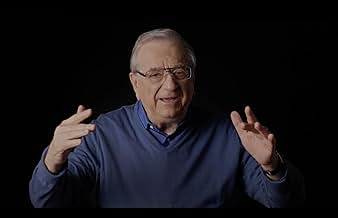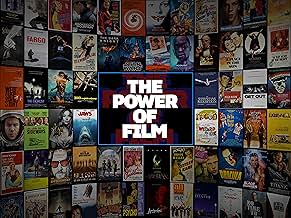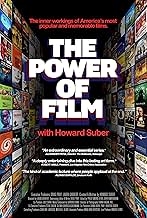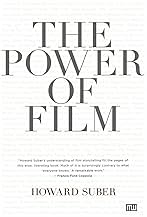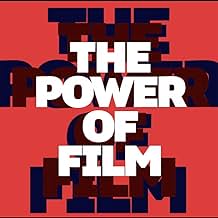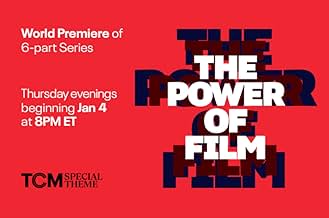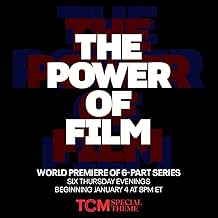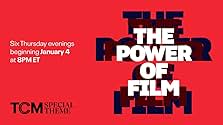Plonge dans l'art de la narration en examinant les principes et les rouages des films américains les plus populaires et les plus mémorables de tous les temps.Plonge dans l'art de la narration en examinant les principes et les rouages des films américains les plus populaires et les plus mémorables de tous les temps.Plonge dans l'art de la narration en examinant les principes et les rouages des films américains les plus populaires et les plus mémorables de tous les temps.
- Casting principal
Parcourir les épisodes
Avis à la une
Mind-numbingly boring and shallow, Professor Blabbermouth takes us into the world of film with nothing new to say while stating the incredibly obvious. If we only had to rely on what this guy says, I doubt anyone other than his immediate family would make it through this (I dropped out after one episode). There are a million film clips that prop up this bore, but they aren't enough to add up to entertainment. The first episode is completely all over the place and makes not much of a point, and the point made isn't much and hardly warranted forty minutes to tell. He should just write down his point on a 3X5 index card and let viewers watch a real movie.
This series is designed to teach people about the elements that go into a successful and memorable film. As such, you get to look at (once again) clips from successful and memorable films. Introducing these films is a nice old man who apparently taught this subject to film makers for decades. He's obviously knowledgeable and has a certain charm, but whatever he is trying to communicate gets lost in his many detours and sidetracks.
Occasionally he manages to stay on track, and when he does this, he isn't necessarily correct. At one point (I can't remember where) he talks about the need for surprise and how repetition can be harmful to the film's impact. Nothing could be further from the truth. Repetition is a fundamental aspect of human life. Repetition is a fundamental aspect of human life. Freud wrote about it and called it the "repetition compulsion" and tied it to the basic death drive. It's the core of most comedies and the way in which most action films anticipate a dramatic confrontation. Gun fighters don't meet for the first time. You see them in matches and anticipate what is going to happen in the final match. Substitute gunfighters for chess champions, gymnists, etc. And you see the structure of most effective dramatic scenes.
Not a complete waste of time, and it's always fun to see memorable scenes even if you've seen them hundreds of times. Along the way there are some good observations.
Occasionally he manages to stay on track, and when he does this, he isn't necessarily correct. At one point (I can't remember where) he talks about the need for surprise and how repetition can be harmful to the film's impact. Nothing could be further from the truth. Repetition is a fundamental aspect of human life. Repetition is a fundamental aspect of human life. Freud wrote about it and called it the "repetition compulsion" and tied it to the basic death drive. It's the core of most comedies and the way in which most action films anticipate a dramatic confrontation. Gun fighters don't meet for the first time. You see them in matches and anticipate what is going to happen in the final match. Substitute gunfighters for chess champions, gymnists, etc. And you see the structure of most effective dramatic scenes.
Not a complete waste of time, and it's always fun to see memorable scenes even if you've seen them hundreds of times. Along the way there are some good observations.
Wow.
This documentary gives us the screenwriting essentials. If you are a serious storyteller, it's a "must see.".
UCLA Professor Howard Suber gifts us with wisdom, from a lifetime of teaching graduate level screenwriting, at the top film school in the world.
Perfectly edited for the general public.
In Prof. Suber's honor, UCLA film students coined the term "HOSH Pivot." Which is an acronym for "Howard Suber's One Hour Pivot," spelled backwards. HOSH means the plot takes a dramatic turn, one hour into the film. Which is a key structure of every great film. Once you've a created a new vocabulary word, you're established as a historical figure.
This documentary is a treasure. Which should be replayed again and again.
This documentary gives us the screenwriting essentials. If you are a serious storyteller, it's a "must see.".
UCLA Professor Howard Suber gifts us with wisdom, from a lifetime of teaching graduate level screenwriting, at the top film school in the world.
Perfectly edited for the general public.
In Prof. Suber's honor, UCLA film students coined the term "HOSH Pivot." Which is an acronym for "Howard Suber's One Hour Pivot," spelled backwards. HOSH means the plot takes a dramatic turn, one hour into the film. Which is a key structure of every great film. Once you've a created a new vocabulary word, you're established as a historical figure.
This documentary is a treasure. Which should be replayed again and again.
This series offers some interesting things to think about but, it seems the professor's train of thought is all over the place. The same few films from more recent years are used from episode to episode, over and over as examples of what his point is. There are so many other films from the classic era that could have been used instead of so many repeat of contemporary films.
I does contain some interesting insights as to what might create a successful screenplay.
The video image of some of the clips at times has a strobing effect that was a bit off-putting.
I so wanted to love this series but it leaves me a bit flat.
I feel it was a missed opportunity to mine the wealth of film material from the past.
I've seen 5 of the 6 episodes so far.
I does contain some interesting insights as to what might create a successful screenplay.
The video image of some of the clips at times has a strobing effect that was a bit off-putting.
I so wanted to love this series but it leaves me a bit flat.
I feel it was a missed opportunity to mine the wealth of film material from the past.
I've seen 5 of the 6 episodes so far.
I reckon the title speaks for itself. Dozens of movies are interpreted and dissected in this docuseries, but that's absolutely not the point. At least not in my opinion. I've never been driven to write a review on a movie/show/whatever, but please go into this series understanding that this is a narrative on storytelling in general. If you love films with a passion that transcends every single other form of storytelling, you will appreciate this series. Otherwise, read a book about the art of literature. Or listen to an album about the art of music. Or perhaps view a painting about the art of (art?). This is for film lovers, made by film lovers, told to you by a film lover. And now reviewed by a film lover.
Hopefully this is read by a film lover.
Hopefully this is read by a film lover.
Meilleurs choix
Connectez-vous pour évaluer et suivre la liste de favoris afin de recevoir des recommandations personnalisées
Détails
- Couleur
Contribuer à cette page
Suggérer une modification ou ajouter du contenu manquant

